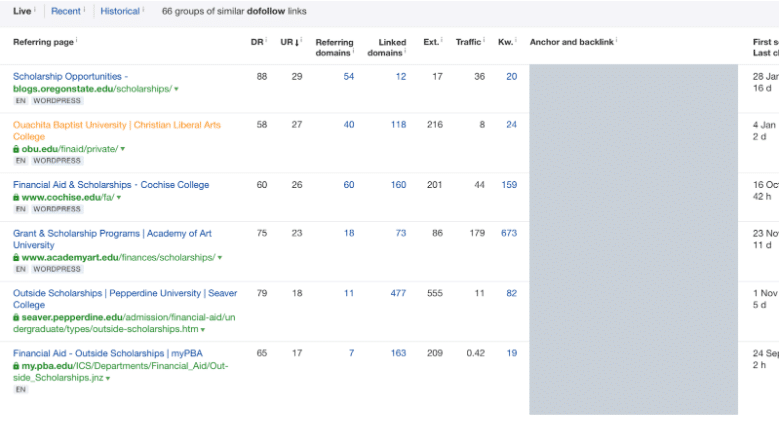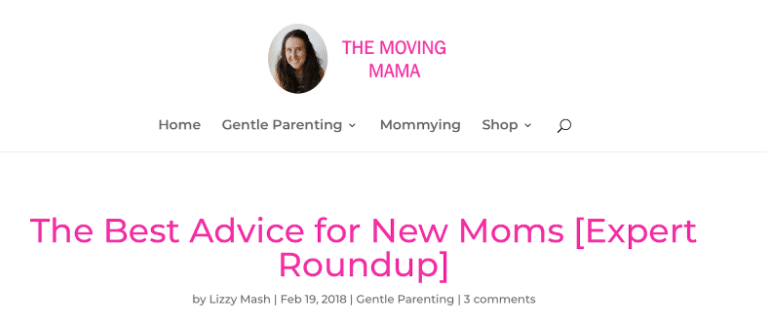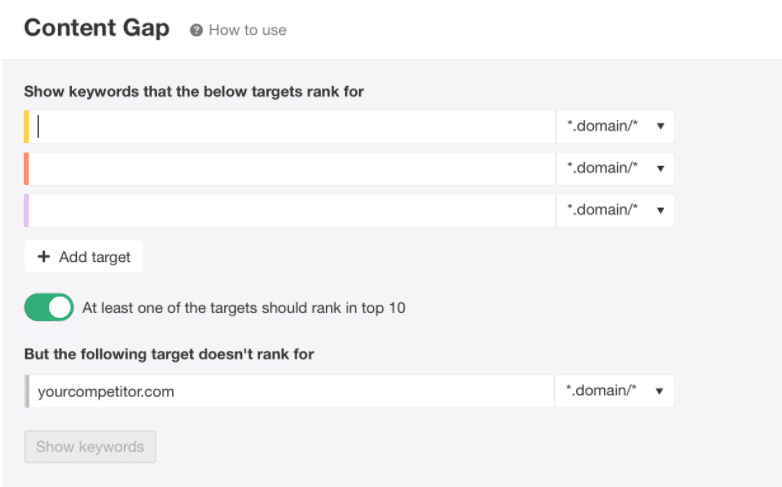Let’s be real: SEO link building is hard. Like, really hard.
And in case you’re wondering, links still matter, maybe more than ever before. Experts continue to include them among Google’s top ranking factors.
What is SEO Link Building?
SEO link building is the process of increasing inbound links to a website with a view to achieving a better position, or ranking, in the Search Engine Results Pages (SERPS). This is an essential part of Search Engine Optimization.
Google views links to your website as a vote in favor of its “quality,” or as a sign that it’s worth showing to users searching for certain keywords. Broadly speaking, the more backlinks a page has, the higher it ranks.
The Current Link Landscape
Today, quality backlinks are harder to acquire. In the current online scenario, you need to do some serious hustling if you want those links.
Link building campaigns in 2020 require patience, perseverance and finesse. You’re going to have to persuade and negotiate, find the optimal moment to ask for that link, or strategically hold back and wait and see what happens.
Because when it comes down to it, there’s no shortage of strategies out there, but the most successful ones with the highest conversion rates revolve around a simple premise: build relationships, not links.
You’re unlikely to get something for nothing, so remember that. Before you even ask for anything, figure out what you can do for your lead. Only then will your chances of getting that backlink increase exponentially.
So if you’re wondering how to build links for SEO in 2020, keep reading for some traditional strategies, some out-of-the-box ones, and some classic approaches with a little twist.
1. Offer a Product Discount
Do you sell a product or a service? One way to snag a backlink is to offer a discount to a specific group of people and then ask for a link back to your site.
For example, does your product serve university students and/or staff? Reach out to universities to see if you can get the product and discount listed on their websites. Many list businesses that offer discounts for students and faculty.
For example, biotech company Boster Bio earned an .edu link from the University of Virginia using this exact strategy.

Alternatively, does your product or service help the members of an established organization? Reach out to them and see if they will link to it from their website. Their members stay informed and get a discount while you get a backlink.
2. Reverse Round-Up
What better way to showcase your expertise than to be featured in an expert round-up?
But even if you’re not asked ahead of time, before the article is actually published, it doesn’t mean you can’t participate.
You can use search for already published round-ups and reach out to the blogger after the fact. Compliment them on their awesome post, tell them who you are and why it matters, and ask them if they’d like to add one more expert opinion to their article.
They might just include you and your words of wisdom. Alternatively, they might wait and include you in their next expert round-up.
Look for posts like these, from Lemon Light and The Every Girl, that showcase each expert’s advice individually along with their websites and sometimes a bio.


3. Bespoke Outreach
Most marketers have received the same, tired, uninspired outreach email hundreds of times. When they get a new one, they just move it to the trash.
You have to make sure your mail stands out, period.
When you send a bespoke email, you need to take the time to stalk research your subject.
Google them, read their About page, check out their LinkedIn profile, and look at their Facebook, Twitter and Instagram to find a few specific details about their life and include it in the email, without being creepy.
This will get their attention and show that you took the time to learn more about them before reaching out. With this approach, you’ve already got a toe (though maybe not a foot) in the door.
4. HARO
You can get some unique, juicy editorial links if you’re willing to Help a Reporter Out, also known as HARO.
Sign up for free on the website and you’ll start receiving three emails a day with a list of articles for which journalists are looking for sources. Generally, folks are looking for response in niches like business and finance, biotech and healthcare, lifestyle and fitness, travel, and entertainment and media.
If you can answer their queries and help them out with your expertise, you could very well score a link from heavy hitters like Forbes, Entrepreneur or Inc., — and maybe even a TV appearance (seriously).
The magic, of course, lies in writing the perfect HARO pitch. And if you’re looking for inspiration, find out what happened when we went hard at HARO for 30 days. Spoiler alert: we slayed it (and so can you!).
5. Scholarship Link Building
It seems like years of abuse by bloggers and business owners setting up fake scholarships solely for link building purposes have left universities and financial aid offices wary, and rightfully so. As a result, many link only to scholarship search engines now and don’t include any “outside scholarships” on their websites.
But you don’t have to write this strategy off completely. If you’ve got the funds and you can create a legit scholarship, there are plenty of universities that still feature these opportunities and a campaign of this kind is quite straightforward.
The best way to find backlink opportunities is to look for an existing scholarship page and run it through Ahrefs (or any other backlink checking tool).
There you can get a list of dozens of dofollow links from universities and colleges that rank external scholarships in just a few minutes.

Then you can take the scholarships you find on these pages (Oregon State, Ouachita Baptist University, etc.) and run them through Ahrefs to find even more leads.
The key here is to have a LEGIT scholarship. Not just $50 — you’ve got to offer something substantial.
6. Case Studies
Without a doubt, one of the best ways to attract links is to write truly stellar content. But that’s much easier said than done. A lot of the information on the web is repetitive. It’s a rehash of a rehash.
So how do you produce content that’s 100% unique and totally quotable? By putting together killer case studies.
These types of articles are yours and yours alone, they offer interesting insight for your industry, and they cannot be replicated elsewhere, though they can be referenced and linked to.
Case studies are excellent linkable assets and are great candidates for attracting links naturally.
Here are two examples, about increasing sales by 220% and boosting web traffic by over 12,000% with no advertising. Impressive and clickworthy, right?
7. Testimonials
Everybody loves testimonials! They offer social proof and can be used to attract more customers and boost business.
So why not make a list of the tools and software you use and then reach out to those companies and offer a glowing testimonial?
When these are published on their website, they generally include a link back to yours.
8. Badges
For this strategy, you’ll have to create an award and a corresponding badge, for example, Top 10 Podcasts for Parents.
Then you’ll need to select the winners and reach out to let them know they’ve won, and not only that, you’re sending them a special badge to upload to their website so everyone knows that they made your top 10 list.
The badge’s embed code should include a link back to your site, so when they upload it, there’s your backlink.
Inspired Bride does this with its photographers and designers, encouraging them to upload this badge to their websites, which includes a link back to their site.

You could do something similar with contributors to your blog, if you accept content from other writers. Create a badge that says “Featured on [YOUR BLOG NAME]” and offer them the chance to display it on their websites. They get social proof and you get a backlink.
Your best bet for a successful campaign would be to pick a relatively obscure market so the companies you recognize aren’t used to getting these kinds of distinctions, which will make them more likely to publish the badge.
9. Interview Others
For this strategy, you’ll need to find a leader in your industry and arrange an interview.
The idea here is to publish the interview on your website and ask them to link back to it from their website.
Best case scenario: you score a backlink. Worst case scenario: you publish a unique interview on your site that offers value to your readers.
One idea for this strategy is to reach out to college professors and ask them to share their expertise in a guest post on your site, and then ask them to announce the interview on the university website with a backlink.
10. Be Interviewed
On the flip side, if you’re an authority in your field, you can reach out to different publications and offer to be interviewed on their website. That text will generally include a link back to your site.
You can also reach out to podcasts and offer to be featured as a guest. Look for podcasts that have an accompanying website. Typically you can get a link back from your bio in the show notes, which are usually published with a link to the podcast.
11. Guestographics and Maps
Switch things up by creating some eye-catching visual content.
The idea is to make a creative, custom graphic that everyone will want to share. You can pick a controversial topic, a trending topic, or a topic that has proven extremely shareable in the past by consulting BuzzSumo.
Publish your infographic with an article, and just like that, you’ve created a valuable asset.
Then, reach out to other sites that might be interested in publishing your infographic and offer to write an original introduction or short article to accompany it. You can include a link back to your site in the infographic’s embed code.
Take it a step further and skip the infographic altogether in favor of a map.
Find an interesting fact or statistic, ideally related to your niche, and create an interactive map. These assets attract links like bees to a honeypot.
12. Awards
Many communities, cities, chambers of commerce, non-profits, and media companies regularly offer local and non-local awards to individuals and companies in a wide range of business areas.
Actively look for competitions to enter by using search operators like "Nominate a business"+"STATE NAME," "best of STATE or CITY"+"nominate," and "best BUSINESS TYPE"+"nominate"+"city."
Follow the instructions on the web and apply or send in your pitch early. Winners (and sometimes even nominees) usually get a link back to their site.
13. Indirect Competition
There’s no reason you can’t work with your competition — if you know how to do it.
Look for other companies in your niche that don’t offer the same services as you and see if you can guest post for them or do a link exchange.
For example, you want to build links to a post on content marketing, so you might look for digital marketing agencies that don’t offer this service and see if a) you can write for them, b) they want to exchange guest posts, or c) they can link to your article while you link to them from a different article.
14. Influencer Video Transcription
It’s time to try to enlist the help of an influencer in your link building efforts.
Find an influencer in your niche with a relevant YouTube video that you think would provide value to your readers. Transcribe the video and publish it on your site.
Let them know and they might share it or, better yet, they might link to it!
Make sure you get permission before doing this, however.
15. University Newspapers
Bring your expertise to a university newspaper.
Pitch an article, positioning yourself as an authority in your niche or business. Often, these sites have strong authority scores — and they tend to be respected.
Although they’re often reserved for students’ writing, you can pitch an article that would be useful for students and write it from a professional’s perspective, including a backlink in the text.
Extra points if you’re an alumnus.
16. Participate in Round-up Posts
This is a link building strategy that requires minimal effort.
On Facebook in particular, in groups dedicated to SEO and blogging, there are always people looking for contributors to their articles.
All you have to do is write up a short answer to the question or topic or share a link to your published content that aligns with the round-up topic, and bam! You get a backlink when the article is published.
17. Create a Round-up Post
Creating a round-up post takes time and effort, but it can pay off in the end.
First you have to find a good keyword and then you have to find people to contribute to your article. You can do cold emailing if you prefer, but you can also reach out on Facebook, which is generally a faster way to find contributors.
Either ask people to help in a Facebook group post or send them messages directly. If you do the latter though, be careful — Facebook doesn’t particularly like this behavior, and we’ve heard of people getting banned for it.
The beauty of a round-up post is that it pretty much writes itself. Also, the content is 100% unique to your website, and who doesn’t want to read an article with input from multiple experts?
You know what else is awesome about round-up posts? The people who participated will often be eager to share it, so now you have a (small) army of bloggers and website owners ready to promote the article, and some may even link to it.
Even if you don’t score any backlinks from participants, this article is a truly linkable asset and it’s a great candidate for acquiring links naturally and through other outreach methods.
Here’s a good example of this strategy in action at The Moving Mama.

18. Content Gap Guest Posting
Guest posting is an old, labor-intensive technique. But it works — and marketers are a big fan of it for a number of reasons.
First, if you pitch some thoughtful ideas to another blogger or business and they accept, you’re guaranteed a link. Second, many times you can include that link within the content, and Google loves contextual links. And third, if your article is good and relevant, it could drive some referral traffic to your blog. What’s not to love?
But when it comes to guest posting, we believe in being strategic. That’s why we like using the content gap approach.
Enter the website you want to write for in Ahref’s site explorer function, and then choose the Content Gap analysis function from the left-hand margin.


Input three of that website’s competitors to see when the competition is writing about and ranking for — but what your target is missing out on.
When you find a good keyword or topic, you’ll want to reach out and ask for a guest post, but don’t forget to explain the research you did! You sought out a topic that your lead is potentially missing out on and should probably cover on his or her blog.
You’ll indubitably be rewarded for going the extra mile and taking the time to find something that would provide real value to your lead’s readers.
SEO Link Building In a Nutshell
There are hundreds of link building strategies out there, so you’ll likely have to play around to see which of them have the best conversion rate for your particular industry.
Building links takes time. Sometimes your technique will be a total flop, but other times, you’ll end up landing huge backlinks that change the course of your content entirely.
It’s important to keep in mind, though, that with just about all of these SEO link building strategies, you’re going to want to provide something of value in exchange for that backlink. They don’t grow on trees, after all.
So don’t be afraid to think outside the box or try something new. Be patient, be helpful, be creative. And do your outreach from a position of generosity. Because once you start building those relationships, some will start to bear fruit, and the backlinks will follow.


Hello, I read your article, and your information about the link building is really amazing and very helpful for me. Thank you very much
Kari,
Thanks for your awesome link building ideas. Sure, I’ll try out reverse expert round-up – finding the already published round up posts and adding my insights to it. Probably the blog owner would accept my request since they get a chance to update their old article with fresh content. That will benefit both of us.
I was looking for the best strategies for link building on google and I ended up on your website. You have really explained it in the best way. Thanks for sharing it.